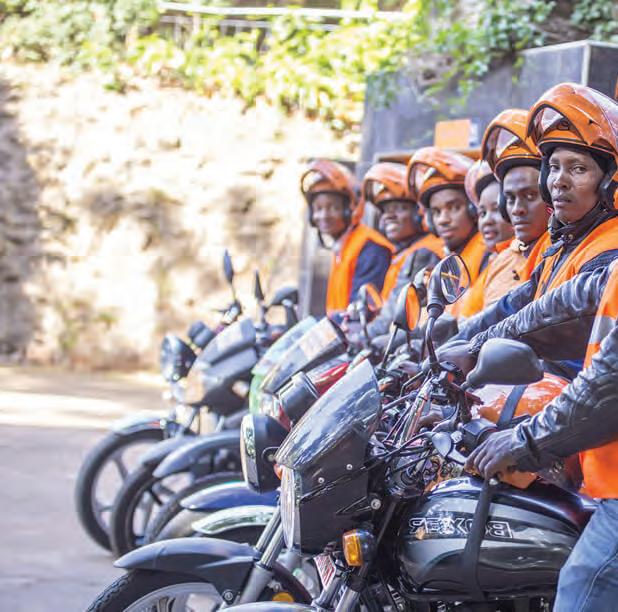
4 minute read
Can Motorbike Taxis Fix Africa's E-Commerce
Can Motorbike Taxis Fix Africa's E-Commerce Problem?
By Anne Kidmose
Advertisement
An Ampersand motorcyclist picks up a customer.
RUNNING LATE FOR A job interview or about to miss a flight? In many African cities, the solution is right around the corner, where readily available motorcycle taxis will take you almost anywhere in a matter of minutes. Prized for their efficiency — and dreaded for their overconfident drivers — these taxis are an essential part of mobility on the continent.
Tech entrepreneurs have been taking note of the efficiency and popularity of the two-wheelers. In the past five years, motorcycle-hailing apps have sprung up across Africa, competing to be the most popular “Uber for motorcycles.” In Uganda, SafeBoda has made a name for itself as a hassle-free alternative to the informal motorcycle taxis, while in West Africa, Max.ng, a Nigerian company, is about to scale up operations. And in Rwanda, Ampersand is introducing a fleet of electric motorcycle taxis.
Motorcycle taxi service providers are beginning to branch out from ferrying passengers to delivering products , tapping into Africa’s emerging e-commerce market. Inadequate infrastructure

SafeBoda has made a alternative to
— coupled with limited and expensive internet delivering everything from cooking oil to sanitary connectivity — has long hobbled Africa’s napkins. The company provides market vendors e-commerce ambitions, so much so that Amazon with smartphones so that cashless payments can doesn’t offer e-commerce services on the be made through its mobile wallet. continent, even though it has tech hubs there. Even though customers have slowly begun The companies behind the motorcycle taxi apps venturing outside their homes, deliveries are here believe they can overcome those limitations. to stay, says SafeBoda co-founder Ricky Rapa And the pandemic has sped up this transition, Thomson. according to industry analyst and former venture When the pandemic first hit, the future of business capitalist Osarumen Osamuyi. was considerably less certain. “The pandemic “COVID-19 was an accelerator for many of the presented us with a very difficult situation,” says existing trends in the industry,” says Osamuyi, who Thomson. Transporting people became illegal due is based between Lagos and Nairobi. “Delivery to social distancing requirements, so Thomson became bigger as the pandemic forced people and his partners had to come up with a creative to have things delivered.” solution, and they had to do it fast. Putting drivers While transporting people remains the main to work as deliverymen did the trick. “It has helped source of business for a us through the pandemic and has grown to become majority of the motorcycle one of our biggest services,” Thomson says. taxi firms, deliveries of food Commuters in Nigeria have also seen some of and other online goods is the country’s most popular motorcycle taxi apps “the goal for many of these pivot from passengers to deliveries. The trend companies,” Osamuyi has been influenced by the decision last year says. by authorities to ban motorcycle taxis, known as SafeBoda launched okadas, in Lagos. Major players on the motorcycle its food delivery service, e-hailing scene, like Gokada, shifted their focus to SafeBoda Food, in deliveries. Today, Gokada claims to be the largest 2019, and in April 2020 it last-mile delivery service in Nigeria. partnered with the U.N. According to Guy-Bertrand Njoya, chief Capital Development financial officer at Max.ng — one of Gokada’s Fund to provide an main competitors — deliveries and passenger e-commerce platform for transportation are two sides of the same coin. fresh produce. Initially, “We have an agnostic approach to delivery, the SafeBoda Shop app be it people or goods,” he says. Max.ng started connected 800 market as a last-mile delivery service supporting large vendors in the capital e-commerce players and later took on passenger Kampala to households; transportation. Still, Njoya prefers to use the term name for itself as a hassle-free o the informal motorcycle taxis. it has since expanded to

In Rwanda, Ampersand is introducing a fleet of electric motorcycle taxis

Taxis from page 23
“mobility company” to describe the business, as it underscores the company’s aim to solve infrastructure needs across the continent.
Those gaps in infrastructure are at the heart of mobility challenges in Africa — for people and for goods.
“Traffic jams make us popular,” says Zaharan Kweka, who earns a living as a motorcycle taxi driver in Dar es Salaam, Tanzania’s largest city. The 25-year-old is one of millions of informally employed drivers in sub-Saharan Africa who make up the backbone of an industry that has an estimated worth of $80 billion. Kweka says that his motorcycle taxi can complete a journey from Dar es Salaam’s suburbs to its bustling center four times faster than a traditional taxi or bus.
When it comes to e-commerce, Southeast Asia’s internet economy is the fastest-growing online market globally, with Africa trailing behind. Still, things on the continent are moving. According to the U.N. Conference on Trade and Development,
the number of online shoppers in Africa has
grown by 18% annually since 2014.
Motorcycle e-hailing companies have the capacity to boost the African e-commerce industry, says Osamuyi, if they stick to deliveries and facilitate online shopping, much like Indonesian super app Gojek. The Jakarta-based company started out with 20 motorcycle taxis in 2009; today it’s an on-demand service for everything from car washing to manicures, connecting customers and merchants.
“I think individual merchants will be successful in Africa, and the platforms that enable online shopping of their items will be successful,” says Osamuyi.
SafeBoda’s Thomson already sounds victorious when he speaks of the future. “The market in Africa is huge … nothing can stop us,” he says with the confidence of a speedway driver about to step on the accelerator. www.ozy.com/around-the-world/can-motorbike-taxisfi x-africas-e-commerce-problem/418981










